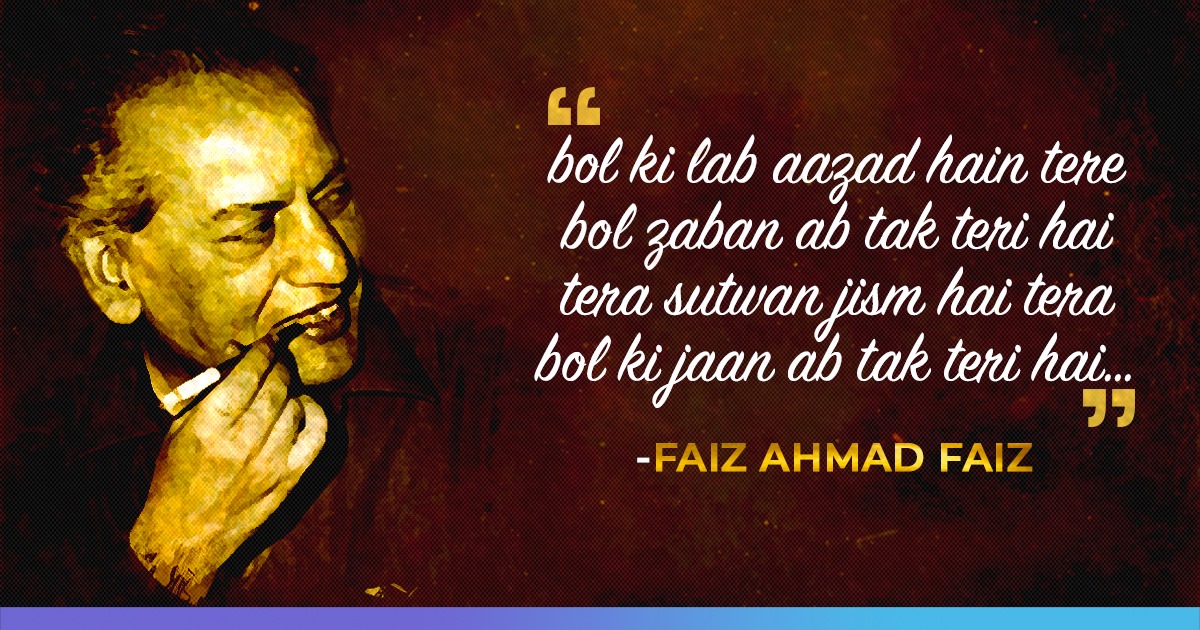Nadia Yousaf
Faiz Ahmed Faiz, born in 1911 in British India, was a renowned Pakistani poet and author. His early poetry, like his renowned piece ‘Subh-e-Azadi ‘, initially centered around traditional themes of romantic love, beauty, and heartbreak. However, as his body of work developed, he began to incorporate broader themes such as justice, revolution, politics, and the interconnectedness of humanity. Despite the prevalence of romantic love and loss in many of his poems, most literary critics do not categorize Faiz primarily as a romantic poet. They assert that his extensive body of work, including ‘Hum Dekhenge ‘, prioritizes themes of justice and revolution. Some critics view his poetry as an unconventional blend of love and revolution, appealing to modern readers who simultaneously cherish their beloved and advocate for humanity.
Faiz’s poetry is characterized by progressive and revolutionary ideas, leading him to be recognized as an artistic rebel. He is renowned for giving voice to the oppressed and marginalized classes, shedding light on their poverty, social discrimination, economic exploitation, and political repression. His poetry, often described as leftist and anti-capitalist, reflects the profound hardships faced by ordinary people, with recurring themes of home, exile, and loss. His grandson, Dr. Ali Madeeh Hashmi, suggests that one of the dominant themes in Faiz’s poetry is the significance, implications, and aftermath of the partition of India. This historical event, which led to the creation of Pakistan, deeply influenced Faiz’s poetry, as he grappled with the social and political consequences of the partition in his work.
Please, watch video and subscribe to the YouTube channel of republicpolicy.com
While some critics view Faiz’s writing style as straddling between romance and love on one end and realism and revolution on the other, they note that he skillfully avoids letting political rhetoric overshadow his poetry. Rejecting the ‘art for art’s sake’ philosophy, Faiz believed that art should inspire action. His poetry often incorporates religious symbolism inspired by Sufism, a mystical Islamic belief system, rather than religious dogma. This influence can be seen in his poem ‘Naqsh-e-Faryadi ‘, where he uses Sufi metaphors to convey his political message. Additionally, his ghazals are lauded for seamlessly integrating socio-economic and political issues into conventional ghazal motifs like love and separation. Many of Faiz’s poems begin by highlighting dire socio-political realities but ultimately convey a message of encouragement and hope for positive change.
Critics have observed a shift in the tone and content of Faiz’s verses in the later years of his life, particularly distinguishing them from the poetry he wrote in his youth and during his incarceration. His later-stage poetry is characterized by a more universal tone, a heightened urgency for change and action, and a more explicit challenge to “decadent tradition.”
In terms of recognition, Faiz’s work, political ideology, and poetry have left an indelible mark, earning him the title of one of the ‘greatest poets’ of Pakistan. His influence extends to the literary and cultural development of Pakistan, with his contributions being celebrated widely. His poem ‘Hum Dekhenge’ became an anthem of resistance during the Zia regime, symbolizing the struggle for democracy and freedom of expression. Awarded the Lenin Peace Prize in 1962, Faiz’s legacy resonated beyond the boundaries of Pakistan, fostering closer relations between the country and the Soviet Union. His impact was further recognized with posthumous honors, including the highest civilian award, the Nishan-e-Imtiaz. In the realm of popular culture, Faiz’s poetic compositions have been featured in various media, showcasing the enduring relevance of his work.
Faiz’s poetry has been translated into several languages, including English and Russian. His own translations of renowned poets’ works into Urdu, such as Pablo Neruda’s ‘Canto General ‘, as well as translations of his work into other languages, have contributed to the dissemination of his literary legacy on a global scale. These translations not only made the works of these poets accessible to Urdu-speaking audiences but also enriched the Urdu literary landscape with diverse influences.

















